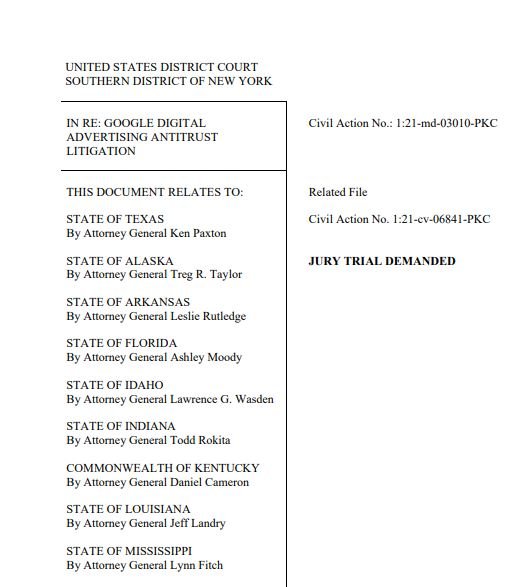In December 2020, several U.S. states filed a lawsuit against Google for engaging in alleged anti-competitive practices in the field of digital advertising. One of the main arguments of the plaintiff states was that the tech giant deliberately limited unpublished ads on Accelerated Mobile Pages (AMP) and now, almost a year later, some details about the company’s unfair practices have been revealed.
The AMP project, launched in 2015, aimed to speed up the loading speed of websites in their mobile version. AMP pages are actually a second version of a conventional website that employs restricted AMP and JavaScript components, usually offered through Google and its own content delivery networks.

While AMP was long an open source project, it was handled with the Benevolent Dictator for Life (BDFL) policy, run by Google Malte Ubl. This changed in 2018, when Ubl announced that a Technical Steering Committee would take control of APM; this Committee would be composed of nine members, of which 4 belong to the Google organizational chart, including the director of operations Joey Rozier.
The plaintiffs argue that employees of Google’s ad server hold meetings with AMP officials to develop complex strategies on the use of this project, preventing the bidding of headers. These tenders allow publishers to offer ad space to multiple ad exchanges instead of abiding by Google’s provisions.
AMP would have limited the compatibility of header bids to just a few ad exchanges, directing bids considered rival through Google’s ad server in order to be able to view its bids and negotiate access to inside information.
In addition, the lawsuit notes that Google increases the loading time of ADS that are AMP by just one second, giving AMP a competitive advantage as limiting non-AMP ads slows down header bids, thus generating a gradual impact on header bids deemed too slow.
Finally, the plaintiffs suggest that Google would have increased AMP’s legitimacy by arbitrarily ranking these pages above non-AMP pages, which appeared far down the list of search results. As a result, administrators of websites that did not use AMP saw traffic to their platforms decrease, which was redirected by Google to publishers that used AMP, which would have reduced the revenue of the affected publishers by up to 40%.
The lawsuit is still being analyzed, so it is not yet possible to say with certainty whether Google will lose these court cases and what the consequences of such a decision could be.
Since its initial launch AMP has been embroiled in controversy. In 2018, developer Jeremy Keith resigned from his position on AMP’s advisory committee, arguing that it was impossible for him to continue lending his ideas to a supposed open source project that never really stopped being part of Google. Another frequent complaint from users is that the AMP specification requires a link to JavaScript hosted on Google, which many developers don’t look favorably on.
The company has sought to mitigate criticism and prejudice against AMP; in 2020, Google announced that the AMP requirement for eligibility in Top Stories would be removed, although the change was not implemented until April 2021. At the time, the company announced that the Top Stories carousel would include all featured content, regardless of whether the AMP format was employed or not, and only considering whether the content complied with search engine policies.
Google has removed some controversial policies related to AMP, although this does not mean that it has stopped promoting its use. Cybersecurity specialists point out the presence of a clear conflict of interest inherent in the way the AMP project is managed, so a real change in the way this system is implemented would require rethinking its entire structure, which it seems that Google has no intention of doing for the time being.
To learn more about information security risks, malware variants, vulnerabilities and information technologies, feel free to access the International Institute of Cyber Security (IICS) websites.

He is a well-known expert in mobile security and malware analysis. He studied Computer Science at NYU and started working as a cyber security analyst in 2003. He is actively working as an anti-malware expert. He also worked for security companies like Kaspersky Lab. His everyday job includes researching about new malware and cyber security incidents. Also he has deep level of knowledge in mobile security and mobile vulnerabilities.











